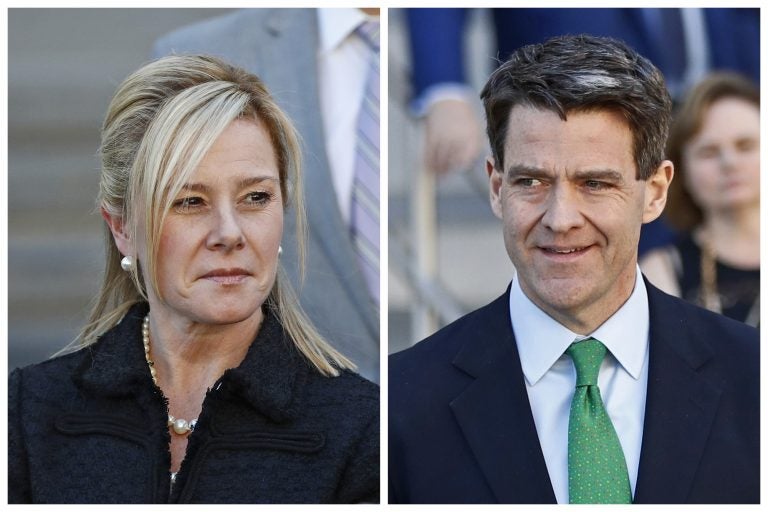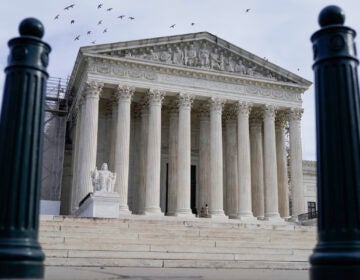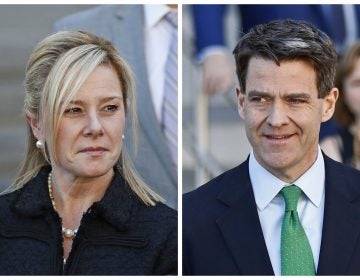Supreme Court tosses two convictions in N.J. ‘Bridgegate’ scandal
Two allies of former Gov. Chris Christie had been convicted, but the court said those verdicts were based on a faulty interpretation of the law.

Bridget Kelly, left, and Bill Baroni leaving federal court after sentencing in Newark, N.J. (Julio Cortez/AP Photo)
The U.S. Supreme Court has tossed the convictions of two people at the center of New Jersey’s “Bridgegate” scandal, which dogged the administration of former Gov. Chris Christie during his second term in office.
The court said in a unanimous decision Thursday that federal prosecutors relied on a faulty interpretation of the law when they charged Bridget Kelly and Bill Baroni for their roles in closing lanes leading to the George Washington Bridge in September 2013.
The plot, which led to major traffic jams for four days at the start of the school year, was a political revenge plot to punish a Democratic mayor who had not endorsed Christie, a Republican, for reelection.
In a unanimous opinion, the court found that the pair could not have violated federal fraud laws because they did not obtain money or property as part of the scheme.
“The evidence the jury heard no doubt shows wrongdoing — deception, corruption, abuse of power,” wrote Justice Elena Kagan in the unanimous ruling. “But the federal fraud statutes at issue do not criminalize all such conduct.”
The case was remanded to the lower court for reconsideration. It is unclear if federal prosecutors will attempt to retry the duo or on what charges.
The Third Circuit Court of Appeals previously threw out several counts against the pair, alleging that they deprived the civil rights of drivers traveling across state lines.
Kelly, who was originally sentenced to 18 months in prison but remained free while her appeals were ongoing, said Thursday she was thrilled by the ruling.
“Today, the Court gave me back my name and began to reverse the six-and-a-half-year nightmare that has become my life,” she said in a statement. “Having been maligned, I now stand with my family and friends knowing that due process worked.”
Kelly added that the ruling “does not absolve those who should have truly been held accountable,” likely a reference to Christie, who was never charged in the case. She had previously said she was “scapegoated” for the scheme.
Christie has long denied any knowledge of the political revenge scheme, but Kelly previously said there was only one person “powerful enough to approve this act” and called her former boss a “bully.”
A third defendant, David Wildstein, pleaded guilty and was sentenced to three years probation. Wildstein testified against Baroni and Kelly at trial.
Baroni was initially sentenced to two years behind bars, and he began serving his sentence before being released after the Supreme Court decided to take the case.
“I am thankful for the Supreme Court of the United States for this clear statement of my innocence. After years of investigations, indictments, trials, appeals and even prison, today the Court has vindicated me and has made clear that I committed no crime,” Baroni said in a statement.
“Today is a long-awaited victory. But, as we are all living in the time of Coronavirus, my joy in being vindicated is tempered by my concern for the people with whom I served time in prison. This is a scary time for all of us; it is especially scary for people in prison who can’t self-isolate; can’t socially distance; can’t stay 6 feet apart. I am going to do all that I can to make sure they are not forgotten.”
“The Supreme Court’s decision speaks for itself, and we are bound by that decision. Beyond that, we have no comment,” said Mark E. Coyne, with the U.S. Attorney’s Office.
WHYY is your source for fact-based, in-depth journalism and information. As a nonprofit organization, we rely on financial support from readers like you. Please give today.



